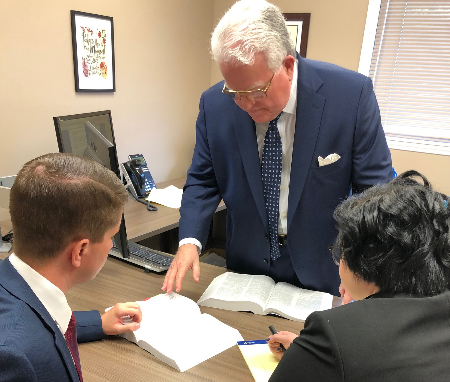Division of Property
Division of Property
The Law Office of Harvey & Baker P.C.
When a couple has little or no marital property, no children and no disagreement on spousal maintenance/alimony, their divorce usually goes very quickly. Most couples, however, have numerous issues to work out during the divorce process. These issues may involve children or significant marital property: personal property, real estate, a family business, large or concealed debts, trusts, real property in other states, joint and separate accounts, investments, insurance, pensions and other assets. In any divorce, especially one involving complex property matters, an experienced family law attorney from Harvey & Baker, P.C. Law Firm in Mount Vernon, IL, can offer valuable guidance and advocacy.
Non-community property states
Most states are non-community property states. This means that the courts must make an equitable division of property during divorce proceedings. Although the specific definition of equitable division of property varies from state to state, it is generally the division of marital property in a fair and just manner according to the specific circumstances of the divorce/dissolution of marriage. Equitable, however, does not always mean equal.
When one spouse obtains property in a community property state, generally the other spouse automatically gains a half-interest in it. In non-community property states, on the other hand, the other spouse only has an interest in the property upon filing for divorce or upon the death of the other spouse.
Courts in non-community property jurisdictions consider numerous factors in allocating property; the factors vary from state to state. However, the courts agree on a few basic, non-financial factors that are appropriate to consider:
- Spouse’s homemaking activities, including child care, food preparation, cleaning and laundry
- Spouse’s forgone opportunities, including not pursuing further education/degrees or a career opportunity
- Spouse’s social obligations, including hosting or attending social events in support of the other spouse’s career
Prenuptial agreements can go a long way toward shaping the outcome of property distribution decisions.
Marital property
Property that must be allocated upon divorce is usually property that was acquired during the marriage — in other words, marital property. In most cases, property acquired before the marriage, property acquired after the divorce and gifts or inheritances received by one spouse during the marriage are not considered marital property.
Once the court decides which property is marital property, it must determine the value of the property. Then, it allocates the property between the spouses. If you and your spouse are able to agree upon the allocation of property and other important matters, you will have a far greater influence over the court’s ultimate decision.
Certain kinds of property continue to create controversy during divorce. Divorcing couples should be aware of the issues these assets present.
- Family home. The primary residential property owned by the divorcing couple is often the marriage’s largest asset. Dealing with its division can be complicated, particularly when there are children involved. Courts often favor allowing the custodial parent to retain the home. Doing so may require complicated arrangements to ensure that the spouse who does not live in the home receives adequate compensation for the home’s value, as well as provisions for ongoing mortgage payments, tax liabilities and upkeep of the home. When these issues cannot be resolved, the couple may be forced to sell the home and divide the proceeds.
- Pensions. Pensions often are the second-largest marital asset. A court in a divorce case may enter a Qualified Domestic Relations Order (QDRO) requiring the administrator of the ERISA-regulated pension to make payments to both the worker and the former spouse.
- Family-owned businesses. When spouses work together in a family-owned business, division of the business presents complex allocation and valuation problems. As with family homes, if there are not enough marital assets to compensate the non-retaining spouse adequately, a forced sale or long-term buyout may be necessary.
Speak to a divorce lawyer
Many couples have a difficult time reaching an agreement about how to divide their property. Because the rules in each state vary significantly and because the ultimate division of property depends on the complexity of your assets and liabilities, it is important to consult with an experienced family law attorney at Harvey & Baker, P.C. Law Firm in Mount Vernon, IL, for assistance.

Contact the Law Office of Harvey & Baker P.C.
Mount Vernon, Illinois
The Law Office of Harvey & Baker P.C. work with families and individuals that are involved in family law matters. We provide comprehensive legal services for family law matters involving divorce, custody issues, adoption, spousal and child abuse, and modifications. Contact our family lawyers to arrange your initial consultation.
The Law Office of Harvey & Baker P.C. is comprised of dedicated and highly experienced family law attorneys. We work with families that are involved in contested and complicated divorce situation. We understand that going through a divorce is often a stressful situation. We offer a high-level of personal service to each of our clients.
CONTACT US
Harvey & Baker, P.C.
2029 Broadway
Mount Vernon, IL 62864
Phone: 618-244-9544
Fax: 618-244-9344
Areas Of Practice:
Family Law
Appellate Representation
Elder Abuse & Neglect
General Litigation
Medical Malpractice & Personal Injury
Mineral Litigation
Attorneys:
Morris Lane Harvey
Derek Baker
Chelbie A Mitchell
Kayli A. Van Houtin

Harvey & Baker, P.C.
2029 Broadway
Mount Vernon, IL 62864
Phone: 618-244-9544
Fax: 618-244-9344

